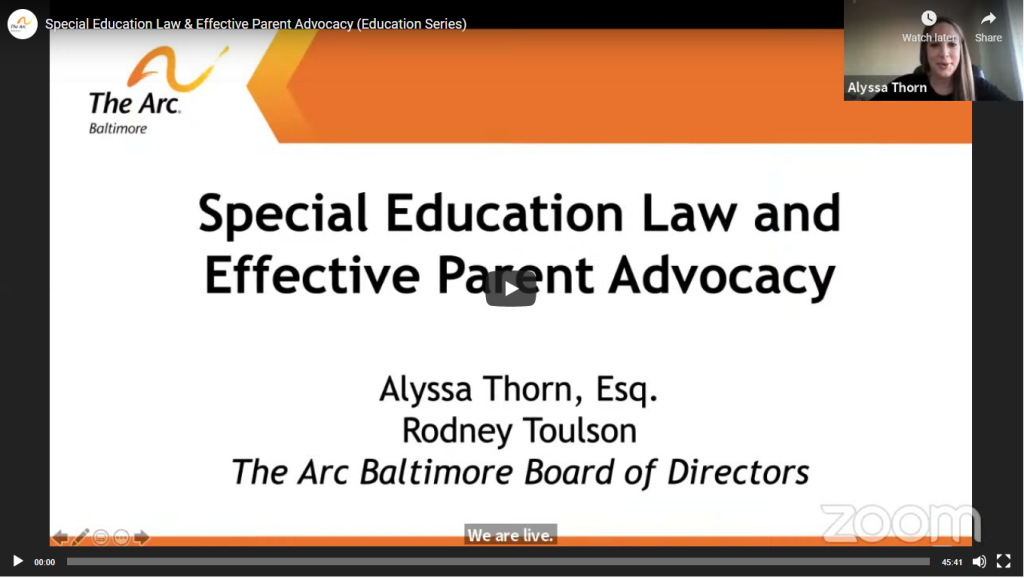When you combine an attorney with expertise in special education with a father who has lived and breathed special education for his son, you get a wealth of both technical and practical information. Two board members with The Arc Baltimore shared their knowledge in a recent education program for families. Alyssa Thorn is an attorney with Project HEAL (Health, Education, Advocacy, and Law) at the Maryland Center for Developmental Disabilities at Kennedy Krieger Institute. Rodney Toulson is a Restorative Practices Consultant for public school and Charter school districts around the country, and the father of a 25-year-old who graduated from Harbour School & Innovative in Owings Mills and who works at Lowes. Here are highlights of the presentation:
- From the first referral for an Individual Education Program (IEP), keep copies of everything and document.
- Keep dates and names of participants in each meeting, and record what was decided and the agreed upon next steps.
- Start a binder to keep organized and chronological records.
- Services determined in the IEP are based on each student’s unique needs, and may include transportation, speech-language, occupational therapy, physical therapy, counseling, social work services, psychological services, and school health/nurse services
- The Individualized Family Service Plan (IFSP) may include services in the child’s natural environment – home, Head Start, daycare, pre-school. IEPs are provided at school.
Both Alyssa and Rodney stressed the importance of preparing for the meeting to develop the IEP/IFSP. Many tips were shared, including bring a partner, friend, or spouse; ask questions when you don’t understand; take notes during the meeting for later reference; request a break if you need one; and try to remain calm. Rodney stressed the goal is not to be adversarial, but to be assertive. Be respectful and know that most educational professionals are trying to do right by your child, but you know your child the best, so they need to hear what you know and think your child needs.
When determining school placement, school districts must present a continuum of options. Options for placement can range from a general education classroom in a neighborhood school with support, to a residential placement. Placement decisions are driven by the student’s needs. In determining if a student should be provided Extended School Year (ESY) services, the IEP team will review several factors to determine if ESY is appropriate. Eligibility for ESY should be reviewed each year.
Finally, Alyssa and Rodney talked about transition planning, which schools in Maryland must begin with students by age 14, to help prepare for transition from high school to the adult world. While transition planning is part of the IEP, often Alyssa and Rodney have known and helped families with their student nearing graduation, and little has been done to prepare. Goals within a transition plan should include academic skills, communication skills, social skills, and occupational and vocational skills. Rodney stressed the importance of parents initiating plans for transition if the school system does not. If the transition planning is missed, services can be lost. Start early.
Finally, while parents should seek to work WITH the educators and school system representatives, in some cases, disputes will occur that require resolution. Parents have options to resolve disagreements, including:
- Request an IEP to discuss concerns
- Contact the Office of Special Education for the student’s county
- File a complaint with the state department of education
- File a request for mediation in writing
- Participate in a resolution session
- File a request for a due process hearing (formal and expensive proceeding)
To avoid these more formal dispute resolution proceedings, try to work with the IEP team to resolve issues. Keep in touch with the child’s service coordinator or IEP chairperson regularly so they are not surprised by your concerns. Use resources such as the Partners for Success Program or Parents’ Place of MD. If needed, contact an attorney or advocate if you need help navigating the system.
If you are looking for more advanced training on Special Education Advocacy, consider taking The Arc US' The Arc@School's Advocacy Curriculum. Learn more below.



